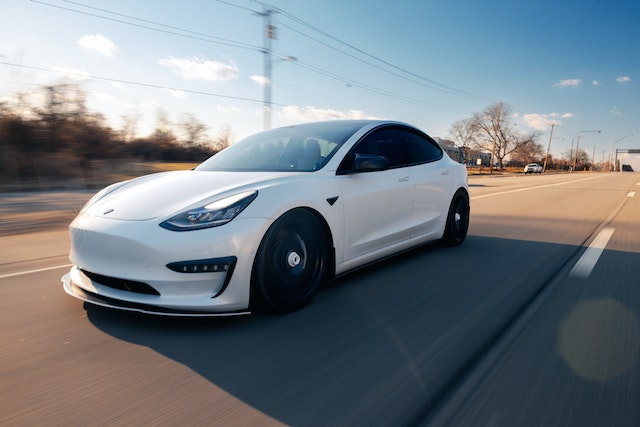The automotive industry has been undergoing a revolutionary change in recent years with the advent of electric vehicles. Electric cars are changing the game in many ways, from the way we drive to the way we think about transportation. In this article, we’ll take a closer look at how electric cars are revolutionizing the automotive industry.

Introduction
Electric cars are vehicles powered by one or more electric motors that run on rechargeable batteries instead of traditional internal combustion engines that burn fossil fuels. They have gained significant popularity in recent years due to their many benefits, including reduced air pollution, lower operating costs, and improved technological advancements.
Environmental Benefits of Electric Cars
One of the most significant benefits of electric cars is their positive impact on the environment. Unlike traditional gasoline-powered cars, electric cars produce zero emissions, making them an eco-friendly alternative. By reducing air pollution and greenhouse gas emissions, electric cars help protect our planet from climate change and reduce the health risks associated with poor air quality.
Electric cars also reduce dependence on oil and promote energy security. They use renewable energy sources to recharge their batteries, which means they can be powered by solar or wind energy. This helps to diversify our energy mix and reduce our dependence on non-renewable resources.
Moreover, electric cars produce less noise pollution compared to traditional cars, which can help improve the quality of life for people living in urban areas.
Economic Benefits of Electric Cars
Electric cars offer a range of economic benefits as well. They have lower operating and maintenance costs compared to traditional cars. They require less maintenance because they have fewer moving parts, and they do not require oil changes, which can save car owners money in the long run.
In addition, electric cars have lower fuel costs because they use electricity instead of gasoline. In many parts of the world, electricity prices are lower than gasoline prices, making electric cars a more cost-effective option. Furthermore, the electric car industry is creating jobs in manufacturing, sales, and service sectors, contributing to economic growth.
Technological Advancements in Electric Cars
Electric cars have come a long way since their inception, and recent technological advancements have made them even more attractive to consumers. One of the most significant improvements has been in battery technology. Modern electric cars have more efficient batteries that offer increased range and fast-charging capabilities.
Many electric cars also feature self-driving capabilities, which can improve road safety and reduce driver fatigue. Self-driving cars use advanced sensors and algorithms to detect obstacles and navigate roads safely. As these technologies continue to develop, they will become more accessible to consumers, further advancing the industry.
Government Incentives for Electric Cars
Many governments around the world offer incentives to encourage the use of electric cars. These incentives can include tax credits, rebates, and free charging stations. Some governments also allow electric cars to use high-occupancy vehicle (HOV) lanes, reducing travel time for commuters.
These incentives help to reduce the upfront costs of purchasing an electric car, making them a more affordable option for consumers. They also promote the development of the electric car industry, which can lead to further advancements in technology and increased accessibility.
Challenges Facing the Electric Car Industry
Despite their many benefits, electric cars still face several challenges. One of the biggest challenges is the high upfront cost. Electric cars are generally more expensive than traditional cars due to the cost of their batteries and other components. This can make them less accessible to consumers with lower incomes.
Another challenge is the limited range of electric cars. While modern electric cars have a range of over 300 miles on a single charge, they still cannot match the range of traditional cars. This can be a concern for consumers who frequently drive long distances.
Moreover, the charging infrastructure for electric cars is still developing. Although there are many charging stations available, they are not as widespread as gas stations, which can limit the range of electric cars. Additionally, charging times can be longer than filling up a gas tank, which can be inconvenient for some drivers.
Finally, the production of electric cars can have a significant environmental impact due to the mining and processing of materials needed for the batteries. It’s important to consider the overall environmental impact of electric cars, including their entire lifecycle, to truly understand their impact on the environment.
Conclusion
Electric cars are revolutionizing the automotive industry in many ways, from their environmental and economic benefits to their technological advancements. While they still face challenges, the electric car industry is growing and developing rapidly, leading to even more advancements and improvements in the future.
FAQs
- Are electric cars more expensive than traditional cars?
- Yes, electric cars can be more expensive than traditional cars due to the cost of their batteries and other components.
- How far can electric cars travel on a single charge?
- Modern electric cars have a range of over 300 miles on a single charge, but this can vary depending on the car model and driving conditions.
- How long does it take to charge an electric car?
- Charging times can vary depending on the car and the charging station, but it can take anywhere from 30 minutes to several hours to fully charge an electric car.
- Are there government incentives for purchasing an electric car?
- Yes, many governments around the world offer incentives such as tax credits, rebates, and free charging stations to encourage the use of electric cars.
- What is the environmental impact of electric cars?
- While electric cars produce zero emissions during use, their production can have a significant environmental impact due to the mining and processing of materials needed for the batteries. It’s important to consider the overall lifecycle of electric cars to fully understand their impact on the environment.
